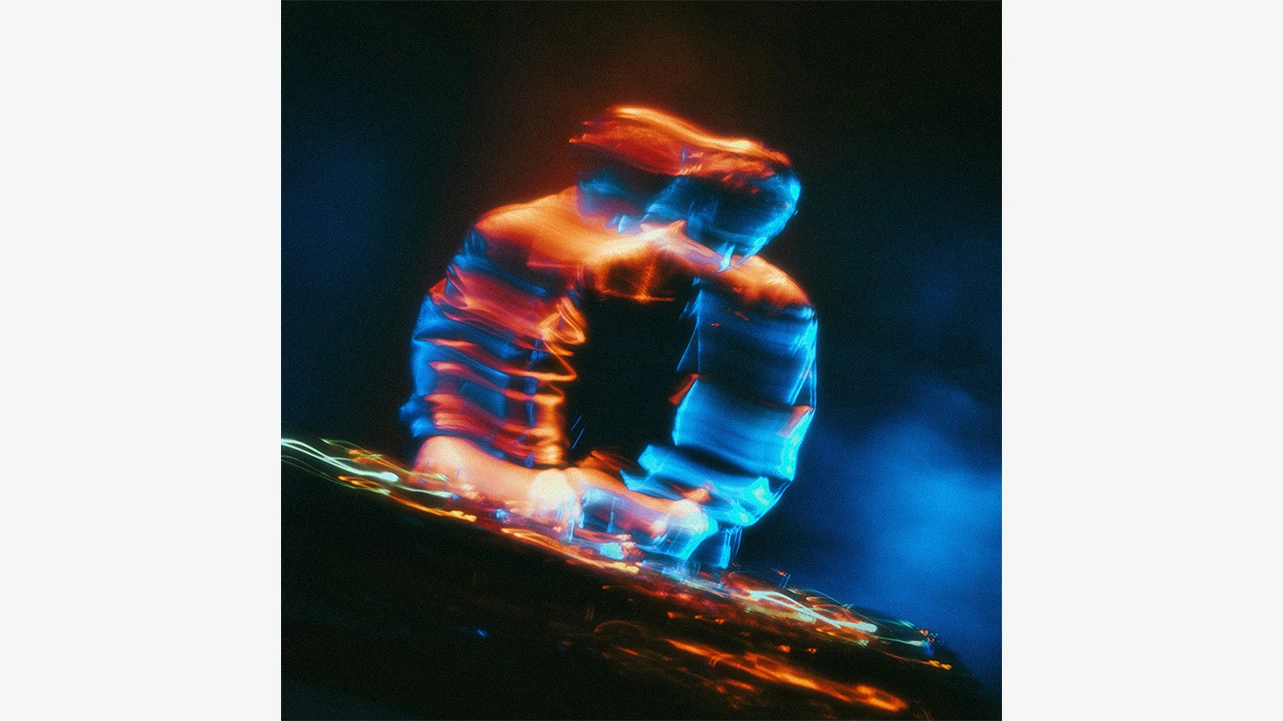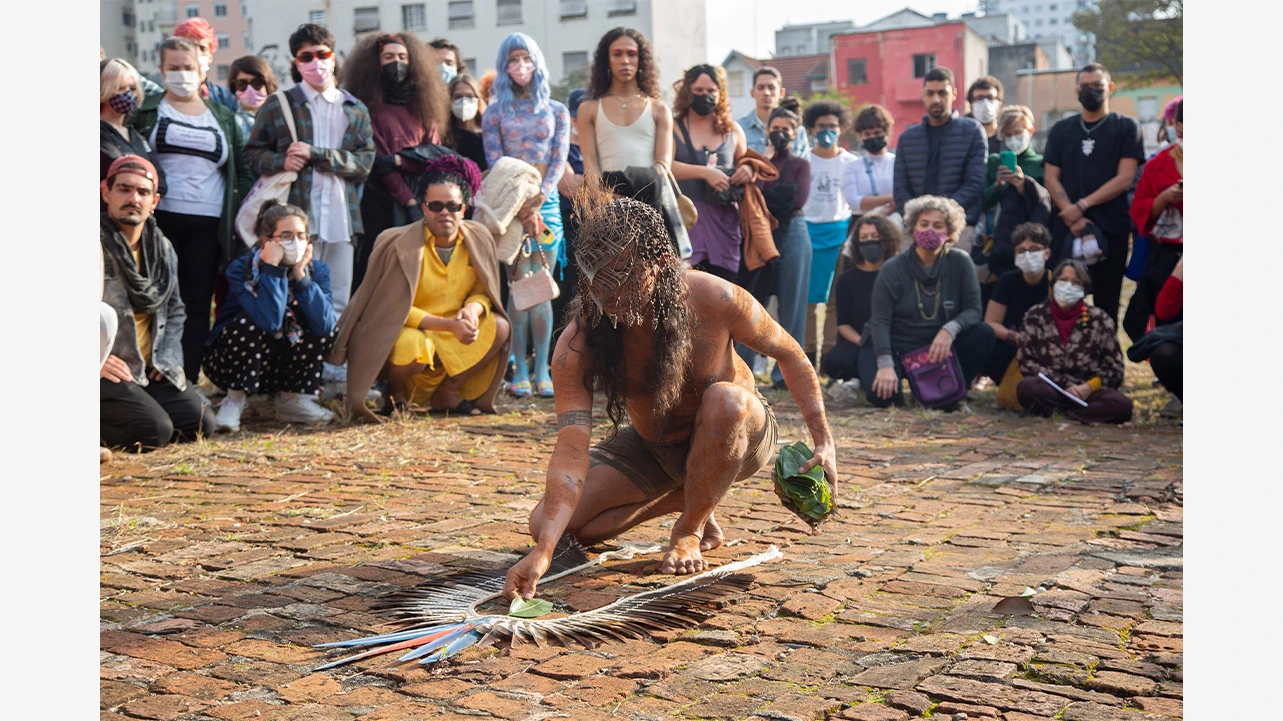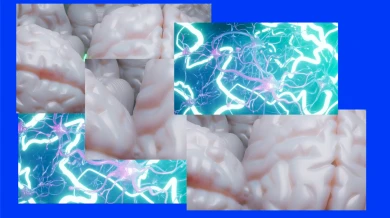
The Museo Reina Sofía contributes, once again, to the annual contemporary art fair ARCOmadrid — which focuses this year on the Amazon — by virtue of the programme Wametisé: Ideas for an Amazofuturism. On this occasion, the Museo hosts two different events conducted by two artists who symbolise its present day and emergence: a performance by trans-Indigenous artist Uýra Sodoma and a DJ set by Uruguayan sound artist Pablo de Vargas, who also works under the moniker Lechuga Zafiro.
According to the cosmogeny of Indigenous peoples from Alto Río Negro (Amazonas), Wametisé, meaning “named places”, references the time when humanity was assigned each territory. Drawing inspiration from this idea, Amazofuturism explores identities and narratives which challenge Western art models, constituting a new form of creation and representation which demonstrates a hybrid existence between the human, the vegetative, the physical and the metaphysical.
Observable within the context of contemporary art is a mounting interest in Indigenous people’s thinking and ways of life, and, in this case, in the Amazonia region identity is underpinned by a collective future and the artistic practices which evolve are, more plurally, forms of resistance and healing that set forth a more sustainable relationship with nature.
Collaboration
Museo Reina Sofía
Organised by
ARCOmadrid / IFEMA MADRID
Sponsor

Agenda
viernes 07 mar 2025 a las 18:00
The Reina with ARCOmadrid. Performance by Uýra Sodoma
Within the Wametisé: Ideas for an Amazofuturism programme, curated by María Wills and Denilson Baniwa
Uýra Sodoma presents her performance inside the framework of the Wametisé: Ideas for an Amazofuturism programme. This diasporic Indigenous artist uses her body as a support to narrate stories through photorealism, performance and installations, in this instance inviting the audience to participate and interact in the performance.
viernes 07 mar 2025 a las 21:30
Reina Party with ARCOmadrid. DJ Set by Lechuga Zafiro
Within the Wametisé: Ideas for an Amazofuturism programme, curated by Magui Dávila
In the construction of this DJ set, Uruguayan sound artist Pablo de Vargas, who also performs under the moniker Lechuga Zafiro, seeks to convey the nuances of the Latin American experience through his music, combining the exploratory nature of dance culture and poetry in sound design. His sets move, with intricacy and energy, between funk and techno, as well as his own productions.
Participants
Uýra Sodoma is a diasporic Indigenous person, two sprits (transvestite) and an inhabitant of Manaus (Amazonas, Brazil), an industrial area amid the forest where she works as an educator with traditional communities. A biologist with an MA in Amazonian Ecology and a visual artist, Uýra uses her body as a support to narrate stories via photorealism, performance and installations. She has participated in over fifty collective exhibitions, both national and international, including at the Museu de Arte Moderna do Rio de Janeiro (Brazil) and the Currier Museum of Art (USA). She has also displayed her work at biennials such as the São Paulo Biennial (Brazil), the Manifesta! Biennial (Kosovo), the 13th São Paulo Architecture Biennial and the 1st Bienal das Amazônias (Brazil), and has received numerous awards, for instance the EDP Award in the Arts (Instituto Tomie Ohtake), the PIPA Prize (2022), the SIM Award for Racial Equality (2023) and the Art Rio FOCO Prize (2023).
Lechuga Zafiro is Pablo de Vargas, a sound artist from Uruguay. His work fuses an interest in experimental music and southern-hemisphere rhythms, and, influenced by the percussion of candombe — Afro-Uruguayan culture — Mexican tribal music and the Angolan rhythms of kuduro, Zafiro came to the attention of dancers and musicians with his debut track “Sapo de Manga”, released in 2013 on Cómeme, followed by the EPs "Aequs Nyama" and "Testigo”. In 2024, he released his first album on the Colombian imprint TraTraTrax. In addition to producing, Zafiro is a DJ who moves, ironically, between different music genres.

Más actividades

Difficulty. Forms and Political Effects of Deviation in Writing and Contemporary Art
23 February – 14 December 2026 – Check programme
Difficulty. Forms and Political Effects of Deviation in Writing and Contemporary Art is a study group aligned towards thinking about how certain contemporary artistic and cultural practices resist the referentiality that dominates the logics of production and the consumption of present-day art. At the centre of this proposal are the concepts of difficulty and deviation, under which it brings together any procedure capable of preventing artistic forms from being absorbed by a meaning that appears previous to and independent from its expression. By ensuring the perceptibility of their languages, difficulty invites us to think of meaning as the effect of a signifying tension; that is, as a productive and creative activity which, from the materiality of art objects, frees aesthetic experience from the representational mandate and those who participate in it from the passiveness associated with tasks of mimesis and decoding.
The economy of the referential norm translates the social logic of capitalism, where insidious forms of capturing subjectivity and meaning operate. In the early 1980s, and adopting a Marxist framework, poet Ron Silliman highlighted how this logic entailed separating language from any mark, gesture, script, form or syntax that might link it to the conditions of its production, rendering it fetichised (as if without a subject) and alienating its users in a use for which they are not responsible. This double dispossession encodes the political strategy of referential objectivity: with no subject and no trace of its own consistency, language is merely an object, that reality in which it disappears.
The political uses of referentiality, more sophisticated today than ever before, sustain the neoliberal-extractivist phase of capitalism that crosses through present-day societies politically, economically and aesthetically. Against them, fugitive artistic practices emerge which, drawing from Black and Queer studies and other subaltern critical positions, reject the objective limits of what exists, invent forms to name what lies outside what has already been named, and return to subjects the capacity to participate in processes of emission and interpretation.
Read from the standpoint of artistic work, the objective capture of referentiality may be called transparency. Viewed from a social contract that reproduces inequality in fixed identity positions, transparent in this objectivity are, precisely, the discourses that maintain the status quo of domination. Opposite the inferno of these discourses, this group aims to collectively explore, through deviant or fugitive works, the paradise of language that Monique Wittig encountered in the estranged practices of literature. For the political potency of difficulty — that is, its contribution to the utopia of a free language among equals — depends on making visible, first, its own deviations; from there, the norm that those deviations transgress; and finally, the narrowness of a norm which in no way exhausts the possibilities ofsaying, signifying, referring and producing a world.
From this denouncement of referential alienation, fetishisation and capture, Difficulty. Forms and Political Effects of Deviation in Writing and Contemporary Art turns its attention to the strategies of resistance deployed by contemporary artists and poets. Its interest is directed towards proposals as evidently difficult or evasive as those of Gertrude Stein, Lyn Hejinian, Theresa Hak Kyung Cha, Kameelah Janan Rasheed, Kathy Acker, María Salgado and Ricardo Carreira, and as seemingly simple as those of Fernanda Laguna, Felix Gonzalez Torres and Cecilia Vicuña, among other examples that can be added according to the desires and dynamics of the group.
The ten study group sessions, held between February and December, combine theoretical seminars, work with artworks from the Museo Reina Sofía’s Collections and exhibitions, reading workshops and public programs. All these formats serve as spaces of encounter to think commonly about certain problems of poetics — that is, certain political questions — of contemporary writing and art.
Difficulty. Forms and Political Effects of Deviation in Writing and Contemporary Art inaugurates the research line Goodbye, Representation, through which the Museo Reina Sofía’s Studies Directorship seeks to explore the emergence of contemporary artistic and cultural practices which move away from representation as a dominant aesthetic-political strategy and redirect their attention toward artistic languages that question the tendency to point, name and fix, advocating instead for fugitive aesthetics. Over its three-year duration, this research line materializes in study groups, seminars, screenings and other forms of public programming.

27th Contemporary Art Conservation Conference
Wednesday, 4, and Thursday, 5 March 2026
The 27th Contemporary Art Conservation Conference, organised by the Museo Reina Sofía’s Department of Conservation and Restoration, with the sponsorship of the Mapfre Foundation, is held on 4 and 5 March 2026. This international encounter sets out to share and debate experience and research, open new channels of study and reflect on conservation and the professional practice of restorers.
This edition will be held with in-person and online attendance formats, occurring simultaneously, via twenty-minute interventions followed by a five-minute Q&A.

Cultural Work
Thursday, 12 February 2026 – 5:30pm
This series is organised by equipoMotor, a group of teenagers, young people and older people who have participated in the Museo Reina Sofía’s previous community education projects, and is structured around four themed blocks that pivot on the monstrous.
Session number two looks to approach film as a place from which cultural work is made visible and processes of production engage in dialogue with artistic creation. From this premise, the session focuses on exploring how audiovisual content is produced, assembled and distributed, from the hands that handle the images to the bodies that participate in its circulation. The aim is to reflect on the invisible effort, precarity and forms of collaboration that uphold cultural life, that transform the filmic experience into an act that recognises and cares for common work.

Alberto Greco. Viva el arte vivo
Tuesday, 10 February 2026 – 7pm
In conjunction with the opening of the exhibition Alberto Greco. Viva el arte vivo, Fernando Davis, the show’s curator, and Amanda de la Garza, the Museo Reina Sofía’s deputy artist director, will converse in the Nouvel Building’s Auditorium 400 on the life and work of the Argentinian artist, a core figure in experimental avant-garde art.
The title of both exhibition and conversation originates from the proclamation “Long Live Arte Vivo” Alberto Greco (Buenos Aires, 1931— Barcelona, 1965) disseminated around the streets and on the walls of Rome. For Greco, arte vivo was an art of the future, an art based on a set of irreverent and untimely gestures, of adventures open to unpredictability melding with life, and which began in 1962, prior to his coining of the term “vivo-dito”. In his Manifiesto dito dell´arte vivo (Dito Arte-Vivo Manifesto), which he pasted on the walls of Genoa, Greco encouraged new contact “with the living elements of our reality: movement, time, people, conversations, smells, rumours, places, situations”. He would also burst into the everyday of Madrid’s streets as he convened a “vivo-dito moment”, culminating in the burning of a canvas painted collectively in Madrid’s Lavapiés neighbourhood.
In addition to founding arte vivo, Alberto Greco was an informalist painter, a queer flâneur, a poet and sometime actor. This intense journey of Greco’s life and art is closely connected to the migrant route he embarked upon in 1950 in Buenos Aires, taking in Atacama and Humahuaca, Paris, Rio de Janeiro, São Paulo, Genoa, Rome, Madrid, Piedralaves, New York and Ibiza and ending abruptly in Barcelona, where he took his own life shortly after writing his final great work, the novel Besos brujos (Bewitching Kisses, 1965).
These inaugural conversations, part of the main working strands of the Museo’s Public Programmes Area, aim to explore in greater depth the exhibition narratives of the shows organised by the Museo from the perspective of artists, curators and specialists.
![Basel Abbas y Ruanne Abou-Rahme, At Those Terrifying Frontiers Where the Existence and Disappearance of People Fade Into Each Other [En esas fronteras aterradoras donde la existencia y la desaparición de personas se disuelven entre sí], 2019](https://recursos.museoreinasofia.es/styles/small_landscape/public/Colecci%C3%B3n/abbasabourahme.png.webp)
Gaza and Aestheticide
Tuesday February 10, 2026 – 16:00 h
“This seminar examines the systematic destruction of Palestinian collective sensibility — what we might call ‛aestheticide’ — that has accompanied Israel’s genocide and ecocide in Gaza, and considers the conditions of artistic practice in its aftermath. Over more than two years, the demolition of universities, archives, museums, and libraries has not only erased cultural and intellectual infrastructure but has also targeted the very possibility of representation itself. The destruction of a people has been accompanied by the destruction of their image, their history, and their capacity to be known: reportage, scholarship, and cultural memory have been deliberately undermined, with media institutions, universities, and museums often complicit in this repression. Gaza consequently functions as a rehearsal space for a possible global future — of fascism, post-liberal authoritarianism, militarized borders, and AI-enabled warfare —, a laboratory for an emerging world order. What, then, becomes of critical analysis and resistance under these conditions? And what becomes of aesthetics and politics?”
—T.J. DemosThis seminar takes place thanks to the art historian’s invitation to Spain by the Miró Foundation. In the context of the museum, it engages in dialogue with a broader line of work on the climate emergency and decolonial perspectives developed within the Museum of the Commons project (2023–2026) of the L’Internationale network, of which the Museo Reina Sofía is a member; as well as with some of the questions that animate the study group Aesthetics of Peace and Desertion Tactics. Finally, it is also embedded in a wider strategy of support for and commitment to the artistic and discursive practices of Palestinian artists and cultural practitioners, most clearly reflected in the TEJA network.